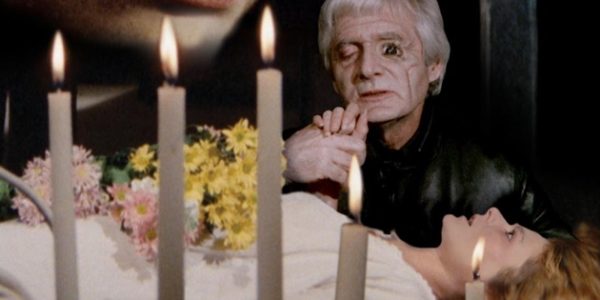Video Dispatches is a regular column covering recent home video releases.
Neurosis (1982) – Redemption

Jess Franco’s Neurosis, which is better known in some circles as Revenge in the House of the Usher, recently made its way to Blu-ray via Kino Lorber’s Redemption line, which is mostly devoted to Euro-sleaze horror like Franco and his contemporary from France, Jean Rollin. And like Rollin, the exercise of watching a Franco film quickly becomes less about making sense or arbitrating whether the film is bad or good, but about falling under the spell of the mood of a filmmaker that, thankfully, saw things differently than everyone else.
That said, Neurosis, which contains film from three decades of Franco’s career, sutured together to make an ode to Edgar Allen Poe, falls somewhere in the middle of the pack of the director’s oeuvre. It certainly casts a wide net for the Franco fan to be caught in, but the strengths between these disparate film elements are also disparate in quality, with the black-and-white footage being by far the most evocative. That’s just to say that for the Franco completists, this will be a moderate pleasure, but I wouldn’t suggest it as a starting point. I prefer the more naked affairs, which manage to find the filmmaker at his most comfortable.
I recently reviewed a couple of Franco releases from Severin, who mostly specialize in his work, and usually manage to add in spectacular special features, often tapping the foremost Franco scholar, Stephen Thrower. While he’s absent here, the Redemption team has done well to record a commentary track with Tim Lucas, author of Obsession: The Films of Jess Franco. Lucas is obviously intimately familiar with Franco and has an inviting tone, albeit scripted. He talks at length about the film’s neo-expressionism, and I’m further convinced that while Franco’s films lie outside commonly used parameters of good and bad, few filmmakers’ work has benefited more from studious criticism.
Escape from LA (1996) – Shout Factory
Fifteen years after one of his most popular films, Escape from New York, John Carpenter revisited Snake Plissken, the talented soldier-cum-convict enlisted by the government for domestic aid — this time, as the title announces, on the opposite pole of the United States. Apparently, Carpenter wanted to make a sequel a decade prior but was unhappy with the script he commissioned and he attributes its final materialization mostly to Kurt Russell’s encouragement.
I have vague memories of seeing Escape from LA at the drive-in as a child, but really all I remember is the most fantastical stuff — urban surfing. Seeing it now via Shout Factory’s new Blu-ray, which boasts a new 4K scan of the original negative, after having seen the majority of Carpenter’s work, including this film’s east coast predecessor, I’m surprised it didn’t vault into my all-time list as a child. The film has such a fun 90s video game feeling to it — a medium that is very close to the filmmaker — and its pitfalls come in ways kids are usually more forgiving of, like thematic explication. This isn’t the sturdy filmmaking of Escape from New York, but make no bones about it, this is still very recognizably a Carpenter film, and a helluva fun one too.
Based on the other Carpenter releases from Shout Factory, I’m a bit surprised there aren’t more supplements, such as a commentary or archival special features. However, there are still six newly produced interviews on the disc. Among them, the most entertaining is Bruce Campbell’s, but the most essential is David Jones, a visual artist on the film, who is both informational and self-critical of the work he did.
Hollywood Horror House (1970) – Vinegar Syndrome
Sometimes known better as Savage Intruder, Donald Wolfe’s psycho-biddy horror film Hollywood Horror House opens with a strangely elegiac visual passage on the wind-strewn Hollywood sign as if to usher us into a transitional moment — the end of a tradition and the beginning of something unknown. The entire movie is marked by the very distinct moment of its production, 1970 — both in psychedelia and a New Hollywood moment, although Wolfe’s film is clearly a production on the fringes.
Miriam Hopkins plays an aging actress, the psycho-biddy, in the tradition of All About Eve and Mommie Dearest, finds a new companion with a young man who has come to her mansion for work. However, this being a Vinegar Syndrome release, this is of course a stranger brew, with wilder rhythms and a serial killer infusion.
The main feature here is the commentary between David Decoteau and David Del Valle. It’s a very enjoyable time. They’re quite familiar with the sub-genres at work here and are playfully opinionated throughout.
Zombie Island Massacre (1984) – Vinegar Syndrome
John N. Carter’s Zombie Island Massacre, also from Vinegar Syndrome, is a less wild release from the stellar cult label. A group of Americans becomes stranded on a Caribbean island and find themselves slowly picked off by a set of murders.
Critic Nathaniel Thompson referred to it as an R-rated episode of Scooby Doo more than anything else, and it’s hard to put it any better than that. There aren’t a whole lot of surprises here — you know what you’re getting — but by its genre standards, it’s pleasant fare with a fun Caribbean setting. Where Hollywood Horror House is a commanding viewing experience, Zombie Island Massacre might best be programmed as the backdrop to drinks with friends.
There aren’t any substantial supplements on the disc, strangely for Vinegar Syndrome, but it seems the actual audiovisual restoration of this film, which looks beautiful here, was quite an undertaking in itself.
Does content like this matter to you?
Become a Member and support film journalism. Unlock access to all of Film Inquiry`s great articles. Join a community of like-minded readers who are passionate about cinema - get access to our private members Network, give back to independent filmmakers, and more.